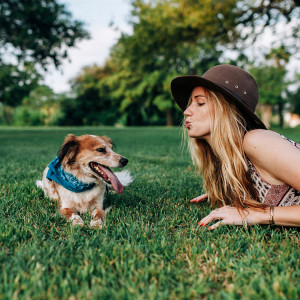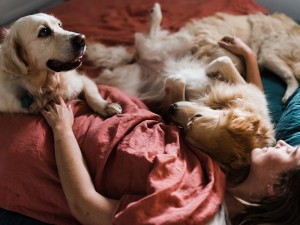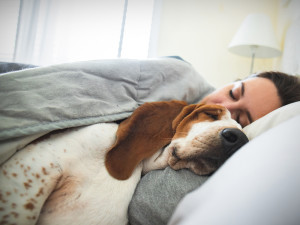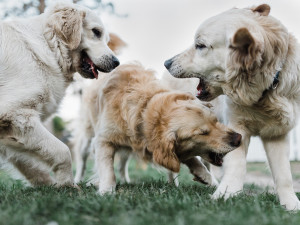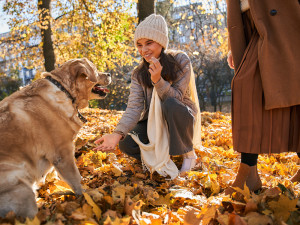Why Does My Dog Freak Out When I Wake Them Up?
“Let sleeping dogs lie” is more than just a confusing old saying.
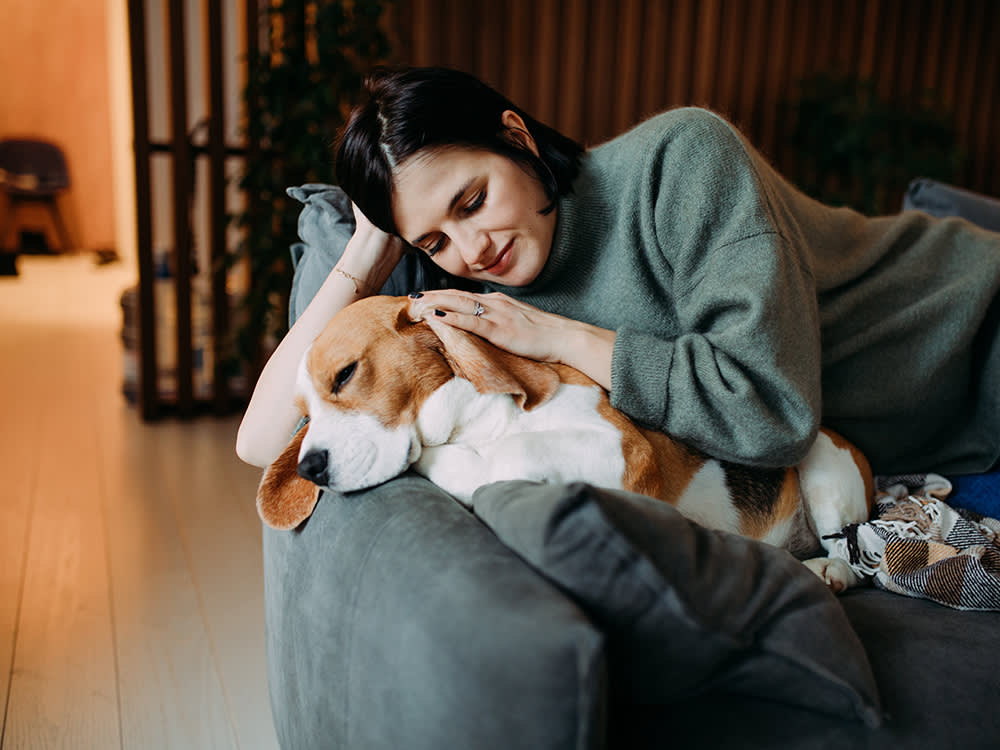
Share Article
“Let sleeping dogs lie” is more than just one of those sayings that gets twisted so much nobody knows what it means anymore. It’s actually a literal warning.
And it’s never more true than when a dog reacts aggressively when startled during sleep. This reaction, known as sleep-startle reflex in dogs, can be pretty scary, especially if there are kids, older folks, or people with disabilities.
Many dogs will easily shake it off when woken suddenly. But some dogs may growl, snap, lunge, and bite when woken unexpectedly. For these dogs, a simple kiss on the head can trigger this reaction, and it can be momentarily terrifying. The good news is there are ways to deal with sleep-startle reflex in dogs.
What is Sleep-Startle Reflex in Dogs?
The startle reflex is instinctive in wild animals. There are many dangers that they need to react to quickly, and assuming that the disturbance is a foe (rather than a friend) is only practical. The seconds that it takes to assess what woke them could mean life or death for many animals in the wild or out on the streets.
Domestic dogs still carry some of these wild traits, and it’s not uncommon for a sleeping dog to attempt a bite when startled awake by touch, movement, or noise. Greyhounds are one dog breed that is known to commonly carry this reflex.
Dogs enter into REM quicker than humans. It is impossible to know how deeply your dog is sleeping and what will startle them awake. This is why sleep-startle reflex can be alarming. In almost all cases, your dog will see within a second or two that it was just you and will immediately stop. It is important to note that this reflex is a reaction and not aggression. Dogs who have sleep-startle reflex are not consciously attacking.
How to Deal With Sleep-Startle Reflex in Dogs
Anyone with a dog who suffers from sleep-startle reflex must first accept that it’s just the way they are. It cannot be trained out, and it certainly cannot be resolved using any form of punishment.
Shouting, scolding, or physically reprimanding your dog will not cure this condition. It is more likely to create a fear of falling asleep; your dog worries whether they will be unexpectedly woken and punished. Your dog will not be able to associate the reaction to the punishment because it was not conscious or deliberate. They will associate sleeping with the punishment.
Finding a gentle way to rouse your dog without startling them is the key. Dogs will typically take naps throughout the day, but this sleep is not always deep.
Here are a few other tips for dealing with a dog who has sleep-startle reflex:
Call their name calmly and quietly to stir them; then, you should be able to move near or around them safely.
Warn your family, friends, and visitors that your dog has this condition.
Educate children that they should not disturb a sleeping dog, especially not someone else’s. They should always ask before approaching.
Provide a safe, quiet space for your dog to sleep undisturbed.
If necessary, use a muzzle when in public to prevent a scary situation from occurring. Not all people will be aware of sleep-startle reflex, and dogs are quickly blamed for what looks like aggressive behavior.
You may be able to condition your dog to respond positively to being tapped on the shoulder or forearm with training. Choose a spot on your dog (avoiding the head) that you want to use as the “wake nicely” trigger. Tap this spot, and reward your dog with a delicious treat. Repeat this while your dog is awake; they will associate being tapped on that spot with positivity. Gradually move on to trying this when they are partially asleep and fully asleep.
Work with your dog to find the best solution for them. And remember: This is only a small flaw in a great family member — and it can be easily managed.

Emma Bowdrey, ISCP
Emma Bowdrey is an ISCP-trained Dog Trainer based in Prague, where she lives with her adopted greyhound, Swift. Emma has worked with dogs since gaining her qualification in Canine Behaviour & Psychology and now runs her own business - Four Long Legs. Emma uses positive reinforcement methods to make each hound a happy one.
Related articles
![Dog barking on the sidewalk in front of a pink wall]()
How to Fix Your Dog’s Non-Stop Barking
You can live in a quiet house again.
![Woman and dog sleeping together in bed]()
Where Should Your Dog Sleep at Nighttime?
It’s a personal preference, but here are the pros and cons.
![Three golden retriever's playing in the grass.]()
How to Break Up a Dog Fight
Keep you and your dog safe in case of a dog fight emergency.
![A woman kneeling down to pet a dog sitting in a pile of colorful leaves in the woods next to the dog's owner]()
Can I Pet Your Dog?
Consent isn’t just for humans. Here’s how to respond when the answer isn’t so simple.


